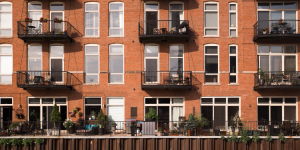
Studying abroad involves many formalities, such as applying for a student visa, taking language tests, opening an overseas bank account, and, very importantly, finding a place to stay. Students can choose between on-campus student residences provided by the university and off-campus options – a single or shared apartment, a homestay, or a private hall of residence. What are the advantages and disadvantages of each?
On-campus housing
- Benefits
Halls of residence run by the university itself, usually within the campus gates or in proximity to the campus, are often the first choice of accommodation for international students. The main reasons for this choice are convenience and safety.
If this is your first time moving to this foreign country, you might not be familiar with the real estate market, administrative processes or even the language there. In that case, it's safer to entrust your university with your accommodation. You will not have to make a site visit or have a local guarantor like when you rent an apartment independently.
There are various types of rooms in halls of residence: dorm-style (with multiple bunk beds, accommodating as many as 4-12 students), shared (between two students), single, ensuite (with its private adjoining toilet and shower), in buildings with communal bathrooms and kitchen. Rooms that are shared or have shared kitchens and bathrooms tend to be cheaper. However, you should consider if the savings you will make are worth the lack of privacy, especially if you need a very quiet space to study.
It should be noted that the availability of on-campus housing will vary between universities and countries. In France, Holland and Australia, on-campus housing is rarely available. In the United Kingdom, single rooms are the norm. Meanwhile, in China and the United States, most on-campus accommodation is likely to be shared.
Small, urban universities might be less likely to have their own residences, while large and/or private universities, especially in smaller towns where it's less easy to find apartments, often offer on-campus accommodation. Universities with better funding also tend to have their own accommodation. Oxford and Cambridge University, Tsinghua University (in Beijing) and all of the Ivy League schools in the US are examples. Universities with many international students also usually offer housing – Middlesex University in London, whose student body is about 45% international, is an example.
Another advantage of on-campus is that utilities are included in the rent: water, electricity, Wifi (although it might not be very fast!). Weekly cleaning services can also be included. There might also be free or cheap washing machines, dryers, photocopy machines, coffee machines and parking space (for cars or bikes). On-campus housing also usually has security cameras, a security guard and night staff.
Living on campus may also give you access to subsidized food or meal plans in the canteens, which will be a mere 5-15 minute walk away from your dorm. Public Chinese universities, for instance, provide students with a card with which they can buy full meals in the canteen at a low price. A breakfast can cost as little as 3-5 yuan (less a US dollar). Many American colleges also have meal plans to which you can subscribe on a semester or yearly basis. These plans can take into account dietary restrictions (e.g., veganism, halal and kosher food). Students living off-campus can, of course, also subscribe to these meal plans, but as they won't be living in close proximity to the canteens, it's less practical.
If you live on campus, you will be close to your classrooms and other facilities like the school libraries, laboratories, gym and sports fields. It's easier to stay up late to study in the school library when you don't really have to commute back home afterward. You will also be closer to many of your university friends who live on campus. It will be easier to attend student parties, get involved in student clubs and events, etc. Last but not least, you will save on transport by not having to commute to school every day.
- Drawbacks
Of course, living on campus also has its disadvantages.
For one, it can be hard to reserve a room on campus. Preference is usually given to first-year students and students on scholarships. If you don't apply early, all the good on-campus rooms might already have been booked. Graduate students might find that the university offers fewer on-campus accommodation options for them, as it's assumed that they're old enough to know how to find their own housing.
If privacy is very important for you, you might find the atmosphere of on-campus housing intolerable. Expect noisy neighbors or roommates, rowdy student parties happening right outside your window, strangers' belongings strewn around a shared bathroom, and the possibility of someone stealing your food from the shared kitchen's fridge. If you are an older student, like a non-traditional undergraduate student or someone returning to grad school in your 30s, you might feel ill at ease in a hall of residence full of 18-to-22 year-olds.
If you are going to live with a roommate, you will have to tactfully negotiate boundaries with them. Within the first few days of moving in, you should discuss what's non-negotiable for you two and what you can compromise on. That can include issues like wearing perfume in the room, inviting friends or romantic partners over, the time by which lights should be turned off, what can be kept on the bathroom rack, etc. Sometimes, fights between roommates can break out over apparently silly things, so it's important to keep communicating. If there is an issue for which you cannot find a solution, you can also request the administration to change rooms. However, you might have to wait until they have another free room or bed to give you.
Another disadvantage is that halls of residence are subject to (sometimes strict!) rules and regulations. There are limited visiting hours for guests, and they usually need to present identification and sign a visitors' book each time they come to see you. Your boyfriend or girlfriend might not be allowed to stay overnight – in some cases, when the residence is male-only or female-only, it might be hard for them to even hang out in your room during the day. You may not be allowed to drink or smoke inside, have pets, use certain cooking appliances, or decorate the room as you wish.
Finally, if you live on campus, you might fall into a comfort zone and not explore the wider town or city. If all of your friends and everything you need to study are in one place, you may feel less inclined to visit interesting places and befriend locals outside of the university. Many people choose to study abroad in the first place for cultural immersion, to discover a new country: if you stay confined to the campus, you won't be able to do that.
Off-campus housing
- Benefits
Living off-campus, meanwhile, forces you to really embrace the local lifestyle. It also helps young adults learn how to be responsible and handle practical things (e.g., paying bills, cooking food), and that experience is a great springboard for living independently when they start working.
Oddly enough, living off-campus can sometimes be cheaper than on-campus. That is provided that you're able to find enough housemates to split the rent with. If you're splitting the rent with three or more roommates, your off-campus house will be very affordable. Unlike in halls of residence, you will also have more privacy here – while housemates still share communal spaces like the living room and kitchen, you might have your private toilet, and no one's bed will be in your room.
It will also be easier to bring guests over or have pets if your housemates don't mind it. Apartment listings usually include a list of criteria for potential housemates: gender, smoker or non-smoker, pets or no pets, students or employees, etc. These are not official rules like in a hall of residence but criteria that can be negotiated. The set of criteria can be quite wide and diverse. For example, you might state that you prefer housemates who are LGBT+ friendly, who like movie nights, who are over 30, etc. In on-campus housing, the university administration assigns you a roommate, but here, you can choose.
Another off-campus housing option is homestays. This means staying with a local family. You will often share at least one meal a day (included in the rent) and spend time socializing with them. This option is hence excellent for students who are learning the local language and need to interact with native speakers or for students in fields that require strong intercultural skills (e.g., international relations, business, social sciences). You won't have to spend much time cooking or cleaning, and you'll feel less homesick when surrounded by people who'll act like an “adoptive family.”
- Drawbacks
Living off-campus, however, remains overall less safe than living on-campus. Even the search for housing in the first place is less safe. You generally need to have a place of accommodation prior to applying for your student visa or entering the country, which means that you'll have to book the house or room online without a site visit.
If you know someone who's already in the town/city you're going to study in, ask them to do you a favor and visit the place on your behalf. That's because online photos can be deceiving: the owner can take them from an angle or with lighting that makes the room look bigger; they can omit to photograph parts of the house that are old and moldy, etc. In the worst scams, the house might not even exist.
Avoid looking for housing on websites where anyone can post unverified ads: Craigslist, Facebook ads, etc. Some of the housing ads on them are scams, and they target international students who don't know the country well. Instead, use specialized websites that verify their ads: Nestpick, AmberStudent, Uniplaces, Spotahome, Homelike, Roomi, Housing Anywhere, Study Abroad Apartments, OCXEE and UniAcco are some reliable student accommodation websites. You can also read reviews by other students who've previously rented the houses listed on the websites. It's safer to pay your deposit via these websites than directly to the bank account of a stranger you've met on Craigslist.
When renting off-campus, you will likely have to deal directly with your landlord at some point, including when discussing or signing your contract. It can be very tricky when your landlord doesn't speak English or your native language well or when you don't speak their language. If you cannot understand the terms of the contract well, do consult a legal professional, or at the very least a legally literate friend, instead of blindly signing it. You may also need to bring a friend to interpret for you each time you need to talk with your landlord during your tenancy. It might be impossible to rent some houses if the contract requires a local guarantor – a permanent resident or citizen of the country, usually a family member, who agrees to pay for your rent should you fail to do so.
You will also have to budget more carefully when you live off-campus. Remember that you'll have to pay for your utilities (water, electricity, internet, etc.) at the end of the month and that this amount can vary from month to month. You will have less easy access to the campus gym or canteen, so you might also need to shop for groceries or (if you wish) get a gym subscription. You will need a plan for a transport budget to commute to and from campus nearly every day. Try to find off-campus housing that's not too far from your university, to avoid spending too much time and money on transport.
Remember that if any of your housemates leave, your rent will suddenly go up. It will increase by 50% if you have only one housemate and they leave, by around 17% if you have two housemates and one leaves, etc. Always keep some extra savings to get by until you can find a new housemate. You should also be careful not to spend so much on housing that you don't have any disposable income left to have fun as a student – clubbing, eating out, going to museums, etc. You could choose a slightly smaller room or a house without a balcony to have a balanced budget.
As seen above, both on-campus and off-campus housing have their perks and downsides. Your choice will really depend on your specific situation and personality. You might have to make some adjustments, but in most situations, it's possible to find an option that allows you to fully enjoy your study-abroad experience.



















